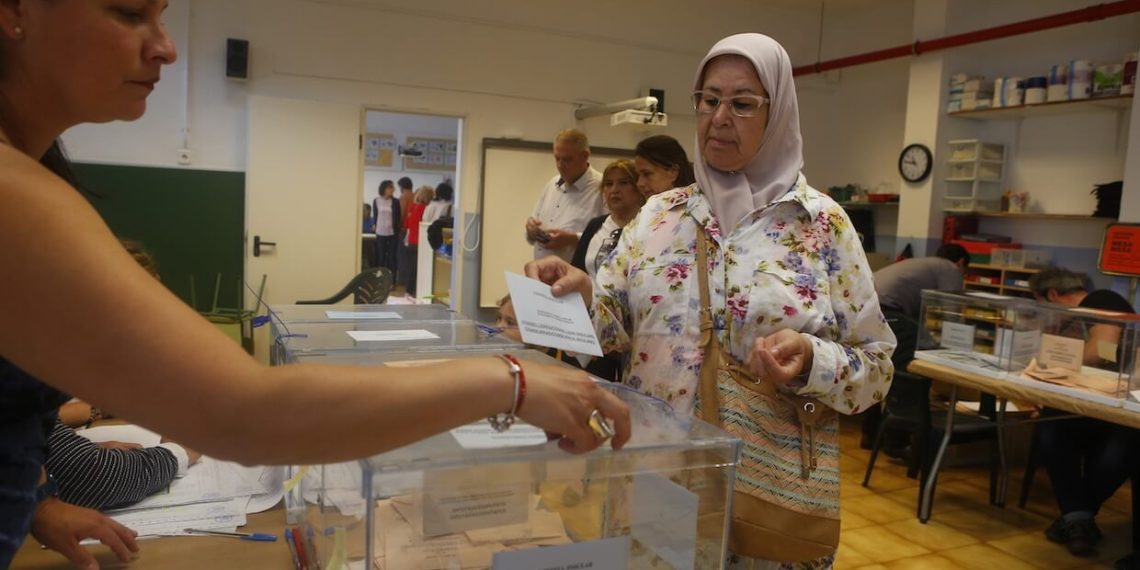DOWNLOAD REPORT
Please cite as:
van Oosten, Sanne. (2025). “Do Muslims Have Different Attitudes and Voting Behaviour Than the Majority Populations of France, Germany and the Netherlands?” European Center for Populism Studies (ECPS). June 10, 2025. https://doi.org/10.55271/rp00100
Abstract
The political preferences of Muslims are often the source of contention and misinformation. In continental Europe, there is not much data available on political preferences of Muslims due to strict privacy regulations, creating a knowledge lacuna allowing for misinformation to fester. In this report, I focus on three countries where privacy regulations are particularly longstanding: France, Germany, and the Netherlands. I use a novel sampling method that complies with privacy regulations while achieving a large enough sample of minority respondents to conduct statistical analyses. Regarding policy preferences, I find that respondents with a Muslim minority background have more conservative attitudes towards same-sex adoption, while showing very similar attitudes to white majority respondents when it comes to gender equality. Respondents with a Muslim minority background are, however, more progressive on immigration and religious freedoms for Muslims. Regarding voting preferences, Muslims show very similar patterns to their majority counterparts, with a few exceptions (La France Insoumise (FI) in France, and in the Netherlands DENK and Partij voor de Vrijheid (PVV)). This paper seeks to put an end to persistent speculation about the political preferences of Muslims, particularly Muslims, in France, Germany, and the Netherlands.
By Sanne van Oosten (Postdoctoral Researcher at University of Oxford, COMPAS, sanne.vanoosten@compas.ox.ac.uk)
Introduction
The political preferences of Muslims in western countries are the subject of recurring speculation (Turnbull-Dugarte and Lopez, 2024; Turnbull-Dugarte et al., 2025; van Oosten, 2025a; 2025b). Political leaders often claim that Muslims vote for them to present themselves as legitimate leaders of all people, while at the same time, some political leaders claim that Muslims and other minorities have been imported by elites to vote for pro-immigrant parties and change society from within (Bracke and Aguilar, 2022; van Oosten, 2025a). Political actors also often point to the attitudes of Muslims to justify their exclusion from national communities (Glas, 2023; Spierings, 2021; De Lange and Mügge, 2015). These claims focus on issues like opposition to gay rights (Puar, 2013), perceived sexism (Farris, 2017), antisemitism (van Oosten, 2024a) or animal cruelty (Backlund and Jungar, 2022; van Oosten, 2024b). Far-right parties use these examples to argue that Muslims do not share core liberal values, and therefore do not belong in liberal societies (van Oosten, 2024b; 2022). These claims, however, are rarely supported by data. This report examines whether Muslims in France, Germany, and the Netherlands hold different political preferences from their white majority counterparts.
Standard sampling strategies do not yield enough minority participants for statistical analyses (Font and Méndez, 2013). Moreover, strict European privacy regulations limit the availability of sampling frames for racial/ethnic and religious minorities in the European context (Simon, 2017). To overcome these challenges, I surveyed a large sample of Kantar-panellists and used a mini-survey to oversample voters from France, Germany, and the Netherlands with a migration background in Turkey (France, Germany, and the Netherlands), North Africa (France), Sub-Saharan Africa (France), the Former Soviet Union (Germany), Surinam (the Netherlands), and Morocco (the Netherlands). I sampled a high number of minority respondents, with 1889 out of a total N of 3058 respondents having a migration background, of which 649 self-identify as Muslim. I asked these respondents for their propensity to vote (PTV) for all political parties in the French, German and Dutch parliament at the time of data collection, as well as their attitudes towards 8 key policy preferences spanning socio-cultural and socio-economic themes.
In this paper, I test whether Muslims and other minority groups differ from majority voters in their support for political parties in France, Germany, and the Netherlands. I find that Muslim voters are much less likely to support PVV in the Netherlands but are just as likely to vote for the RN in France or AfD in Germany (all three far right). Minority and majority voters are equally likely to support mainstream left parties, such as PS in France, the SPD in Germany, and PvdA in the Netherlands. Muslim minority voters are more likely to support left-populist parties DENK in the Netherlands and FI in France. In terms of policy preferences, respondents with a Muslim minority background hold more conservative views on same-sex adoption but show similar attitudes to majority respondents on gender equality. They are, however, more progressive on immigration and Muslim religious freedoms.
This report aims to contribute to the debate about the voting behaviour of Muslims in Western Europe, a debate that is often speculative and not based on data from academic scholars. Far right party leaders, thinkers and pundits have fuelled misunderstandings about minority voting patterns. In reality, the political preferences of Muslims, a minority, are very similar to the political preferences of the majority population. This report seeks to provide clarity and offer a data-driven response to counter the narrative that some political leaders might use to exploit the supposed voting behaviours of minorities for their political gain. Through empirical analysis, this study contributes to a more accurate understanding of ethnic minority political preferences and aims to challenge rhetoric with factual evidence.
Sampling Method and Sample Composition
I conducted this research in France (van Oosten et al., 2024a), Germany (van Oosten et al., 2024b) and the Netherlands (van Oosten et al., 2024c), three countries with key differences. In France, there is a strong emphasis on citizenship, secularism and a strong division between church and state (Kuru, 2008). In Germany, Christian political parties have had a longstanding presence (Ahrens et al., 2022) and the approach towards Muslims is characterised by the history of integration of guestworkers (Yurdakul, 2009). The Netherlands has a host of Christian parties (Kešić and Duyvendak, 2019), a tradition of high minority representation in politics (Hughes, 2016: 560), increased by the emergence of a political party run by Muslim parliamentarians and voicing Muslim interests in 2017, DENK (van Oosten et al., 2024d). All three countries have a history of parliamentarians from mainstream and populist radical right parties espousing Islamophobic rhetoric, with France and the Netherlands having a longer and more vociferous history of populist radical right parties and Germany being relatively new to the game and taking on a comparatively less strident tone (Brubaker, 2017).
I oversampled respondents with specific migration backgrounds to make group-specific statistical inferences (Font and Méndez, 2013: 48) and chose minoritised groups: numeric minorities that state experiencing discrimination to the largest extent (FRA: European Union Agency for Fundamental Rights, 2017: 31). In France, the oversampled groups of ethnic minority citizens consist of French citizens with a North-African (Morocco, Tunisia, Algeria), Sub-Saharan African (Niger, Mauritania, Ivory Coast, French Sudan, Senegal, Chad, Gabon, Cameroon, Congo) and Turkish background. In Germany, I oversampled German citizens with a Turkish and Former Soviet Union (FSU) background. In the Netherlands, I oversampled Dutch citizens with a Turkish, Moroccan and Surinamese background. Some groups have come to France, Germany or the Netherlands as a result of the colonial ties between host and home country, some came as guest workers (FRA: European Union Agency for Fundamental Rights, 2017: 93). I also oversampled French citizens with a Turkish background and German re-migrants from the FSU. Some, but not all, of the oversampled migration backgrounds are countries with Muslim-majority populations, making it possible to disentangle whether differences are either religiously or ethnically/racially driven. In this paper, I present data for the Muslim subgroup, but the data also includes other minoritised groups and analyses by these groups are also available for researchers.
After running pilots and obtaining the ethics approval, (see appendix: van Oosten, 2025c), I gathered data between March and August of 2020 amongst 3058 citizens of France, Germany and the Netherlands, administered by survey agency Kantar Public (for all replication materials and appendices, see van Oosten, 2025b). One important challenge in surveying ethnic/racial minority groups comes from the General Data Protection Regulation (GDPR), a European law legally restricting saving data on race and ethnicity (European Commission 2018). I overcame this challenge by employing a large-scale filter question to the representative Kantar-panels in all three countries. I asked a very large sample to participate in a mini survey. The first and only question of this mini survey asks where their mother and father were born. If either one of their parents were born in a country of origin I wanted to oversample, I redirected this respondent to the full survey. If not, I either terminated the survey or redirected a small percentage to the full survey. This enabled us to form sizable groups of minority citizens for our final survey, ensuring ample diversity, a feature so often missing from survey research (e.g. Coppock and McClellan, 2018). Though there is still a chance of selection bias (see van Oosten, 2025d for a discussion on the selection bias in this sample), I have variables to weight the data on gender, migration background, education, age, urbanisation and region, and the findings are broadly the same with and without weights.
Respondents received so-called ‘LifePoints’ (France and Germany) or ‘Nipoints’ (the Netherlands) for the completion of the survey. With these points, respondents can periodically convert their saved points to an online gift card. The survey took about fifteen minutes to complete, which translated to an equivalent of two euros in gift card value. I ended up with the following number of respondents in each group:
 I assessed migration background by inquiring about the birthplaces of respondents’ mothers and fathers. It was necessary to ask this question first for sampling purposes. To minimise potential ordering effects on the data, I randomised the order in which respondents viewed the policy questions and experimental profiles (for the full questionnaire, see appendix in van Oosten, 2025c). To mitigate acquiescence bias, where respondents tend to agree with statements, I randomised the wording of the policy questions. For instance, one half of the sample saw the statement: “the taxes for this rich should be raised” and the other half saw “the taxes for the rich should be lowered” and I recoded the variables accordingly. I prepared the data using R-package ‘tidyr’ (Wickham, 2020, see all code and replication materials here: van Oosten, 2025c).
I assessed migration background by inquiring about the birthplaces of respondents’ mothers and fathers. It was necessary to ask this question first for sampling purposes. To minimise potential ordering effects on the data, I randomised the order in which respondents viewed the policy questions and experimental profiles (for the full questionnaire, see appendix in van Oosten, 2025c). To mitigate acquiescence bias, where respondents tend to agree with statements, I randomised the wording of the policy questions. For instance, one half of the sample saw the statement: “the taxes for this rich should be raised” and the other half saw “the taxes for the rich should be lowered” and I recoded the variables accordingly. I prepared the data using R-package ‘tidyr’ (Wickham, 2020, see all code and replication materials here: van Oosten, 2025c).
Minorities’ Policy Preferences
In the following section, I first present the policy preferences of two groups: non-religious ethnic majority respondents and Muslim ethnic minority respondents (for other subgroups see appendix at van Oosten, 2025c). I present the distribution of the responses in a histogram, with a black line indicating the mean score. I asked respondents to indicate their agreement with a series of policy statements using an 11-point scale, ranging from 0 (strongly disagree) to 10 (strongly agree). The statements covered a broad range of topics, including attitudes towards state intervention, immigration, Islam, gender and sexuality. The attitudes towards state intervention are as follows: “The tax rate for the rich must be higher/lower,” “Our government should raise/lower support for the unemployed,” “Our government should do less/more to combat climate change than now,” and “Our government needs to lower/raise fuel prices.” Attitudes towards immigration and Islam are as follows: “Immigrants are a burden/an asset to our country,” “Islam should (not) be restricted by law.” I measure gender attitudes as follows: “That men and women receive equal pay for equal work should (not) be regulated by law,” and sexuality as follows: “Homosexual couples should (not) be allowed to adopt children.”
I compared the responses of non-religious ethnic majority respondents with those of ethnic minority respondents who self-identified as practicing Muslims. Differences between the groups were negligible for most policy areas, including taxation, unemployment, climate policy, fuel prices, and gender equality. However, Muslim respondents were more likely to oppose adoption rights for same-sex couples, and more supportive of immigration and religious freedoms for Muslims.
Subsequently, I present data for voting preferences. I asked respondents about their willingness to vote for a wide range of political parties in their respective countries using so-called “Propensity to Vote” (PTV) questions. Respondents were asked: “Please indicate the likelihood that you will ever vote for the following parties. If you are certain that you will never vote for this party then choose 0; if you are certain to vote for this party someday, then enter 10. Of course you can also choose an intermediate position.” In France, the list of parties included LREM, LR, PS, MoDem, FI, PCF, RN (formerly Front National), and MR. In Germany, I asked about CDU, SPD, AfD, FDP, Die Linke, Grüne, and CSU. In the Netherlands, the full list consisted of CDA, ChristenUnie, D66, DENK, FvD, GroenLinks, PvdA, PvdD, PVV, SGP, SP, and VVD.
In the figures below, I present histograms of the responses for two parties per country: FI and RN in France, Die Linke and AfD in Germany, and DENK and PVV in the Netherlands. These pairs were selected to contrast parties often associated with the ethnic majority versus those associated with minority or immigrant support. Full results for all parties are available in the appendix (van Oosten, 2025c). Our findings show that there are relatively few differences in voting propensities between non-religious ethnic majority respondents and Muslim ethnic minority respondents in France and Germany. In France, Muslims are about as likely as non-religious majority respondents to consider voting for both RN and FI. Similarly, in Germany, I find little difference between these two groups in their willingness to vote for Die Linke or AfD. The Netherlands stands out in this regard: Muslim respondents are significantly more likely to consider voting for DENK, a party with strong minority and Muslim support, while being far less likely to vote for the PVV, a party known for its anti-Muslim rhetoric. This suggests that differences in vote propensity by group are more pronounced in the Dutch context than in France or Germany.







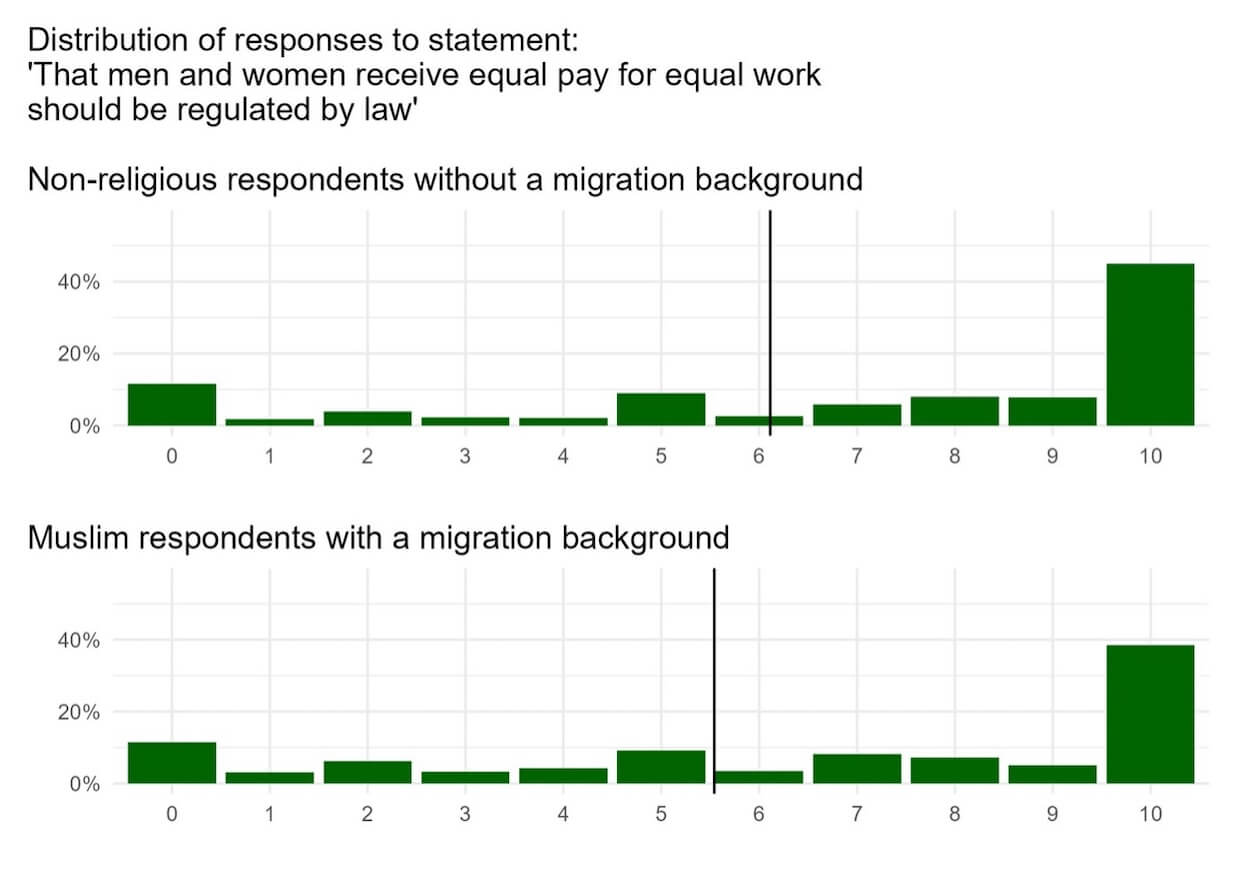

Minorities’ Voting Preferences



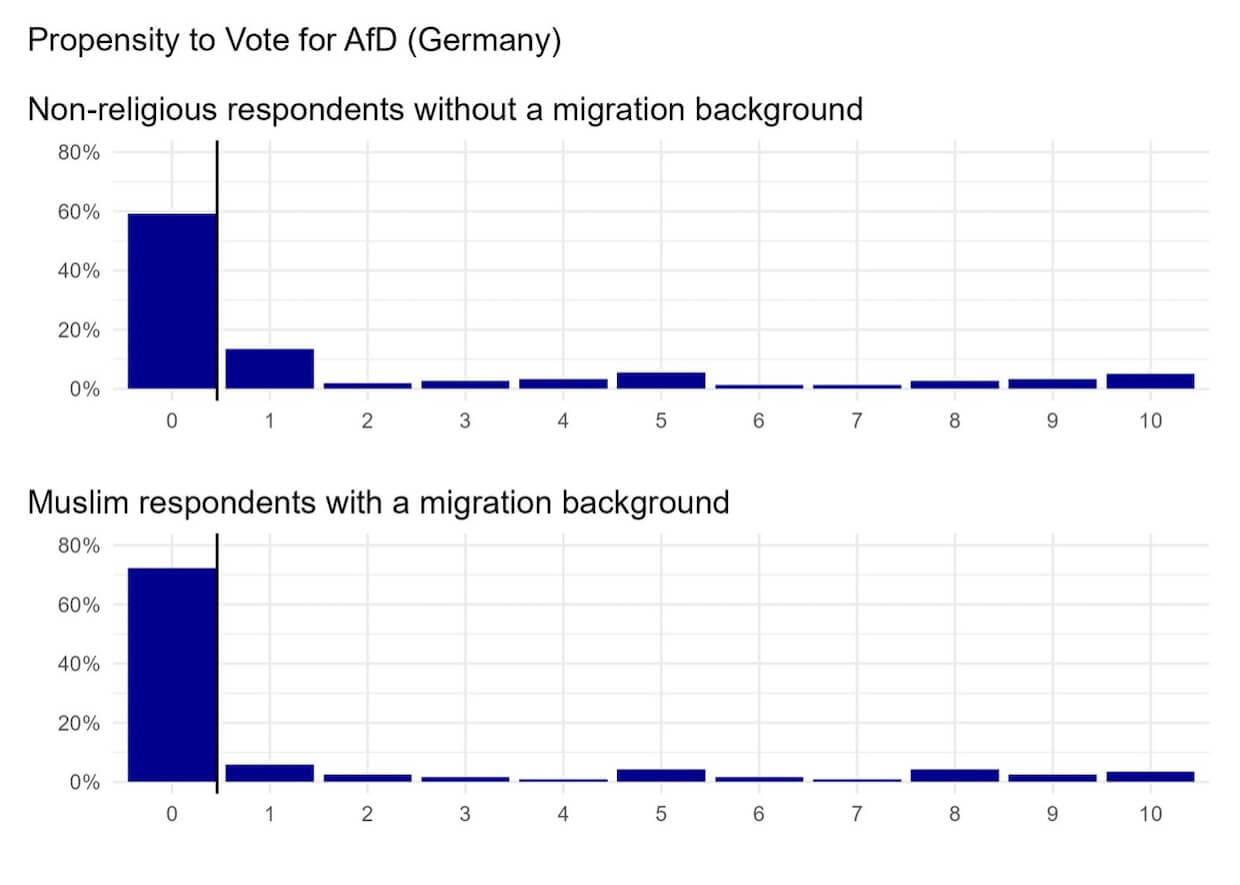
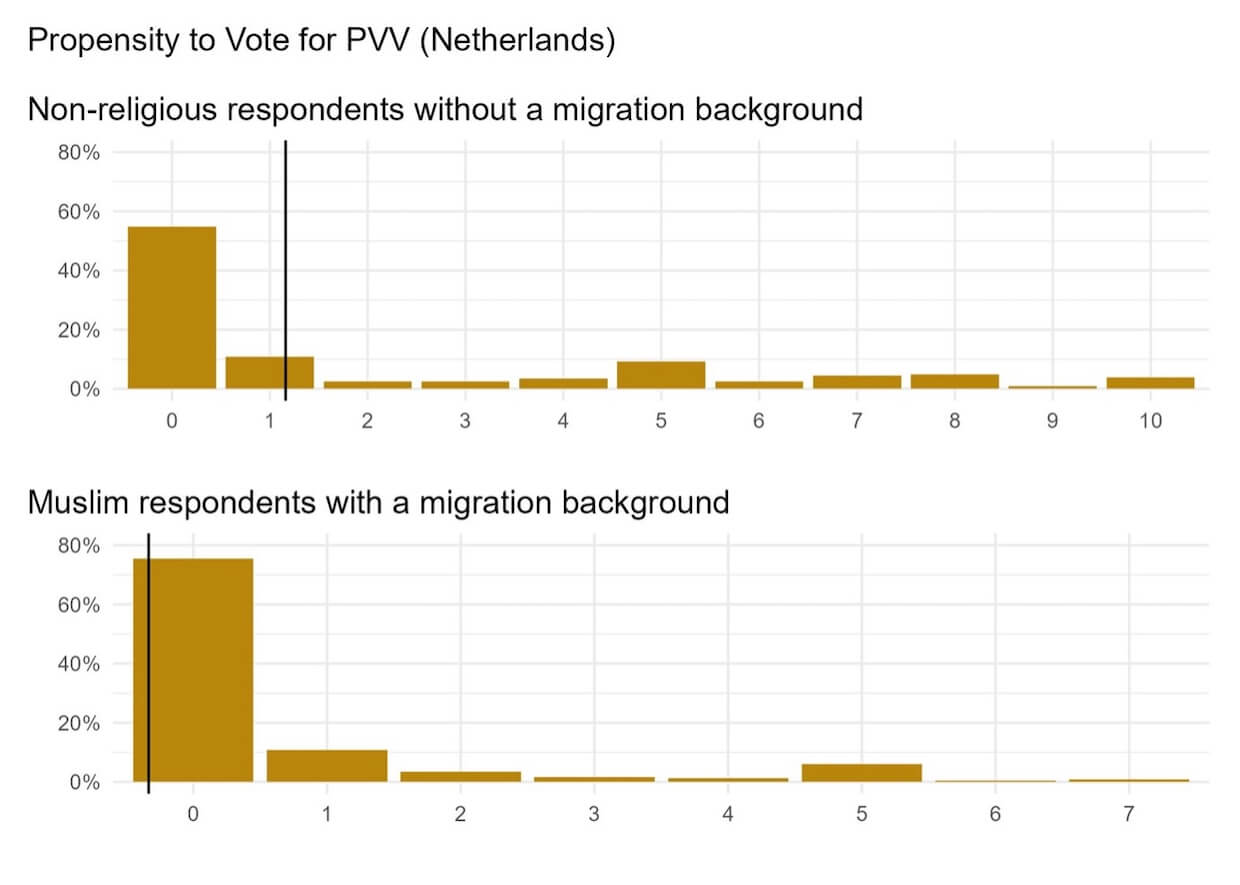
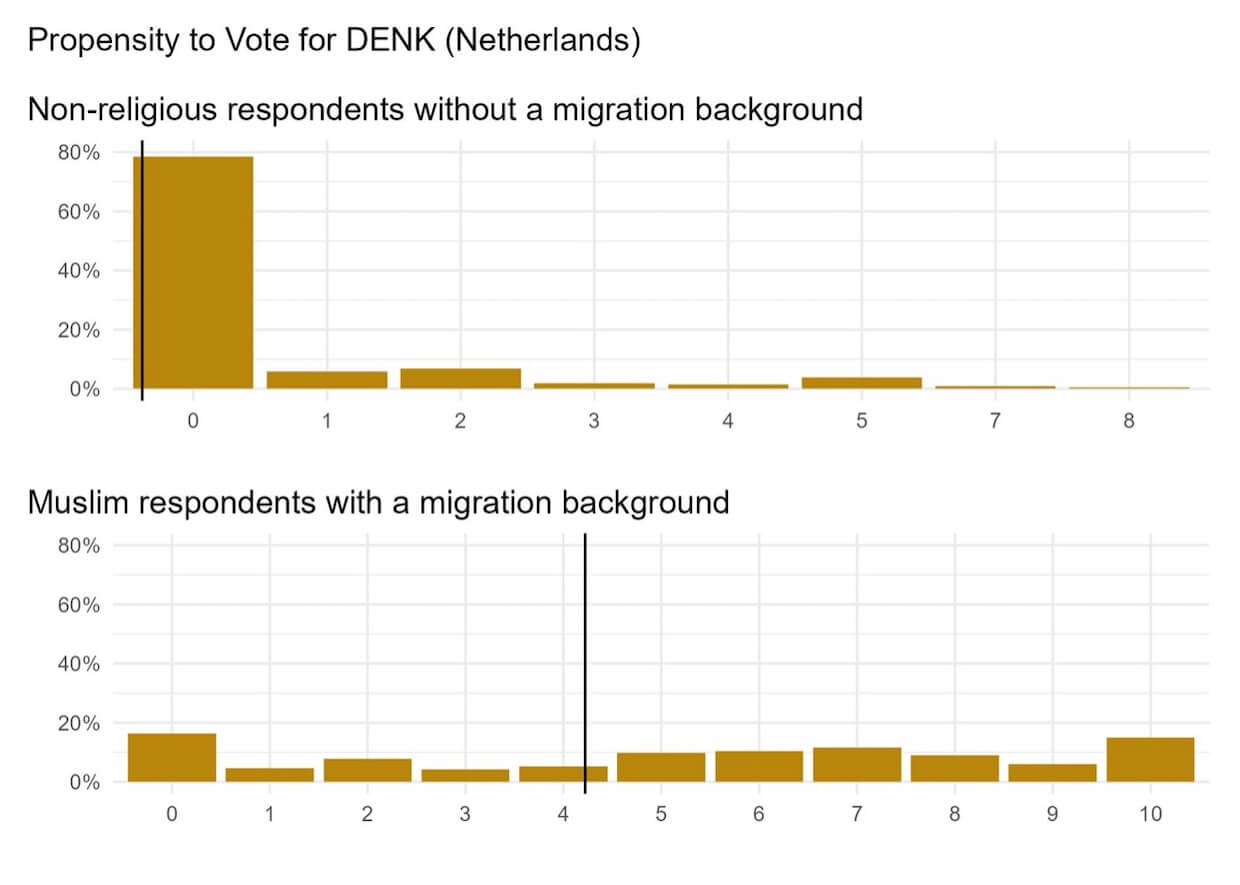 Conclusion
Conclusion
In terms of policy preferences, the differences between Muslims and non-religious ethnic majority respondents are generally small, except in a few areas. Muslims tend to be more supportive of immigration and Muslim rights and less supportive of same-sex couples adopting children. There are no major differences on issues like gender equality, though. When it comes to voting preferences, there are bigger differences in the Netherlands compared to France and Germany. In the Netherlands, Muslims are much less likely to vote for the PVV, but more likely to vote for DENK. In France and Germany, there are fewer differences between Muslims and non-religious ethnic majorities, with both groups showing similar preferences for parties like RN and FI in France, and AfD and Die Linke in Germany.
This paper addresses the ongoing speculations about the policy and voting preferences of Muslims in France, Germany, and the Netherlands. Political leaders and commentators regularly spread misinformation; possibly unintentionally, possibly deliberately (van Oosten, 2025a). This false information about minority voting habits can mislead the public and fuel xenophobic views. In reality, Muslims often share similar political preferences with the majority population, though not always. This paper presents descriptive statistics to challenge false narratives. Combating misinformation is vital for the health of democracies, as it helps maintain informed discussions and trust in democratic institutions.
References
Ahrens, P., Ayoub, P. M., & Lang, S. (2022). “Leading from behind? Gender equality in Germany during the Merkel era.” In: Leading from behind (pp. 1–19). Routledge.
Backlund, A., & Jungar, A.-C. (2024). “Animal advocacy and the radical right: The case of Sweden.” Journal of Political Ideologies, 29(3), 614–633. https://doi.org/10.1080/13569317.2022.2138292
Bracke, S., & Hernández Aguilar, L. M. (2020). “‘They love death as we love life’: The ‘Muslim question’ and the biopolitics of replacement.” British Journal of Sociology, 71(4), 680–701. https://doi.org/10.1111/1468-4446.12742
Brubaker, Rogers. (2017). “Between Nationalism and Civilizationism: The European Populist Moment in Comparative Perspective.” Ethnic and Racial Studies 40 (8): 1191–1226. https://doi.org/10.1080/01419870.2017.1294700.
Font, J, and M Méndez. (2013). Surveying Ethnic Minorities and Immigrant Populations. Amsterdam: IMISCOE Research Amsterdam University Press. www.imiscoe.org.
FRA: European Union Agency for Fundamental Rights. (2017). Second European Union Minorities and Discrimination Survey (EU-MIDIS II): Main Results. https://doi.org/10.2811/902610.
Glas, Saskia. (2023). “What Gender Values Do Muslims Resist? How Religiosity and Acculturation Over Time Shape Muslims’ Public-Sphere Equality, Family Role Divisions, and Sexual Liberalization Values Differently.” Social Forces, Volume 101, Issue 3, March 2023, Pages 1199–1229, https://doi.org/10.1093/sf/soac004.
Hughes, Melanie M. (2016). “Electoral Systems and the Legislative Representation of Muslim Ethnic Minority Women in the West, 2000-2010.” Parliamentary Affairs 69: 548–68. https://doi.org/10.1093/pa/gsv062.
Kešić, Josip, and Jan Willem Duyvendak. (2019). “The Nation under Threat: Secularist, Racial and Populist Nativism in the Netherlands.” Patterns of Prejudice 53 (5): 441–63. https://doi.org/10.1080/0031322X.2019.1656886.
Kuru, Ahmet T. (2008). “Secularism, State Policies, and Muslims in Europe Analyzing French Exceptionalism.” Comperative Politics 41 (1): 1–19. https://doi.org/10.5129/001041508×12911362383552.
de Lange, S. L., & Mügge, L. M. (2015). “Gender and right-wing populism in the Low Countries: Ideological variations across parties and time.” Patterns of Prejudice, 49(1–2), 61–80. https://doi.org/10.1080/0031322X.2015.1014199
Simon, Patrick. (2017). “The Failure of the Importation of Ethno-Racial Statistics in Europe: Debates and Controversies.” Ethnic and Racial Studies 40 (13): 2326–32. https://doi.org/10.1080/01419870.2017.1344278
Spierings, N. (2021). “Homonationalism and voting for the populist radical right: Addressing unanswered questions by zooming in on the Dutch case.” International Journal of Public Opinion Research, 33(1), 171–182. https://doi.org/10.1093/ijpor/edaa005
Turnbull-Dugarte, S. J., López Ortega, A., & Hunklinger, M. (2025). “Do citizens stereotype Muslims as an illiberal bogeyman? Evidence from a double-list experiment.” British Journal of Political Science, 55, e23. https://doi.org/10.1017/S0007123424000437
Turnbull-Dugarte, S. J., & López Ortega, A. (2024). “Instrumentally inclusive: The political psychology of homonationalism.” American Political Science Review, 118(3), 1360–1378. https://doi.org/10.1017/S0003055423000849
van Oosten, S. (2022) “What shapes voter expectations of Muslim politicians’ views on homosexuality: stereotyping or projection?” Electoral Studies, 80(December). Elsevier Ltd: 1–11. https://doi.org/10.1016/j.electstud.2022.102553
van Oosten S., Mügge L., Hakhverdian A, Van der Pas D. and Vermeulen F. (2024a). French Ethnic Minority and Muslim Attitudes, Voting, Identity and Discrimination. (EMMAVID) – EMMAVID Data France. Harvard Dataverse. DOI: https://doi.org/10.7910/DVN/ULQEAY
van Oosten S., Mügge L., Hakhverdian A., Van der Pas D. and Vermeulen F. (2024b). German Ethnic Minority and Muslim Attitudes, Voting, Identity and Discrimination. (EMMAVID) – EMMAVID Data Germany. Harvard Dataverse. DOI: https://doi.org/10.7910/DVN/GT4N9J
van Oosten S., Mügge L., Hakhverdian A., Van der Pas D. and Vermeulen F. (2024c). Dutch Ethnic Minority and Muslim Attitudes, Voting, Identity and Discrimination (EMMAVID) – EMMAVID Data the Netherlands. Harvard Dataverse. DOI: https://doi.org/10.7910/DVN/BGVJZQ
van Oosten, S., Mügge, L., Hakhverdian, A., & van der Pas, D. (2024d). “What explains voting for DENK: Issues, discrimination or in-group favouritism?” Representation, 60(4), 601–623.https://doi.org/10.1080/00344893.2024.2387011
van Oosten, S. (2024a).” Judeonationalism: Calling out antisemitism to discredit Muslims.” ECPR The Loop, 2024(6). https://theloop.ecpr.eu/judeonationalism-antisemitism-for-the-discrediting-of-muslims/ (accessed on April 10, 2025).
van Oosten, S. (2024b). “Animeauxnationalism: ‘They are eating the pets’.” Digressions and Impressions.https://digressionsnimpressions.typepad.com/digressionsimpressions/2024/10/animeauxnationalism-they-are-eating-the-pets-guest-post-by-sanne-van-oosten.html (accessed on April 10, 2025).
van Oosten, S. (2025a). “The Importance of In-group Favouritism in Explaining Voting for PRRPs: A Study of Minority and Majority Groups in France, Germany and the Netherlands.” Populism & Politics (P&P). European Center for Populism Studies (ECPS). January 12, 2025. https://doi.org/10.55271/pp0046
van Oosten, S. (2025b). “The ‘Awkward Alliance’ of the Left and the Right.” European Center for Populism Studies (ECPS). https://www.populismstudies.org/the-awkward-alliance-of-the-left-and-the-right/ (accessed on April 10, 2025).
Yurdakul, Gökçe. 2009. From Guest Workers into Muslims: The Transformation of Turkish Immigrant Associations in Germany. Newcastle upon Tyne.

